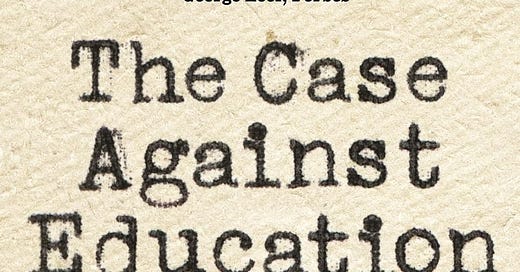
Douglas Belkin, who has an admirably adversarial publication record on higher ed, spotlights my The Case Against Education in his latest piece in The Wall Street Journal:
One result of this transactional attitude has been a sharp increase in cheating. College is one of the few products whose consumers try to get as little out of it as possible, because its market value is tied to the credential, not to the education that it is meant to represent, says Bryan Caplan, an economist at George Mason University and author of “The Case Against Education.”
Cheating is a rational choice on the part of students when credentials are decoupled from learning, Caplan says. He believes that 80% of the value of graduating college today is the signal it sends to employers, and that few students outside of the hard sciences learn much of real value.
Music to my ears, with one big caveat.
Namely: While his picture of higher ed is suitably negative, Belkin dodges one inconvenient truth. He bluntly tells us, “The pandemic drove home a sobering realization for a lot of middle-class American families: ‘College for all’ is broken for most.” Yet he fails to discuss the data on annual earnings as a function on education.
Here’s what we see if we look at median earnings for full-time workers ages 25-34 by highest degree. In 2010, this was $37,220 for high school grads and $55,920 for college grads, implying a college premium of +50%. In 2021, the most recently available year, the numbers were $39,710 and $61,610, implying a college premium of +55%!* That’s right, the college premium for young workers actually rose during the decade that supposedly exposed the failures of high ed for young workers.
“But much of that premium isn’t causal!” you say? I fully agree; I cover the issue of ability bias in gory detail in The Case Against Education. But I know of no reason to think that the ratio of genuine effect to apparent effect has fallen.
“How can this be true if I am correct?” I proverbially respond, “What does that have to do with the price of tea in China?” Once you accept that education raises earnings primarily by signaling — not building — skill, you decouple predictions about learning from predictions about earning. As well you should, because they’re barely related.
That said, Belkin is completely right to emphasize that college is a financial mistake for many students. Students who enroll but fail to graduate reliably get negative returns. So do the many graduates who end up malemployed in non-college jobs. The critical insight is that these negative outcomes are highly predictable based on high school performance, test scores, and college major. “Playing the averages” is a good general strategy, but “playing the conditional averages” is far superior. Dissidents like Belkin and myself aside, however, most elites keep stubbornly coaching weaker students to throw Hail Mary passes with their lives and pray for the best.
* In The Case Against Education, I focused on mean rather than median earnings, which exhibit even higher education premia because high-education earnings have a much fatter right tail than low-education earnings.










Bryan,
20y-ish reader, rare commenter....
I love your thinking on education...and I think your reporting on it might benefit a little bit from ONE further line. Even considering all the signaling ... your major matters.
When you say: 55,920 for college grads --- that's a fairly strongly double-humped average.
My line, from checking earnings by major off and on for a while:
College degrees that start with calculus improve earnings
College degrees that involve programming improve earnings
College degrees that result in licensure (Accounting, Nursing) improve earnings
Those salaries have averages much closer to $100k than 50.
College degrees that don't do 1 of the above barely nudge earnings at all.
The rest mostly don't.
In most states you can cut the cost of college / university in half. Do Running State / College in High School for your last 2 years - AND MAKE SURE THAT YOU SELECT CLASSES THAT WILL TRANSFER TO THE TARGET DEPARTMENT AT THE STATE UNIVERSITY. Bust your butt. Transfer after graduation. You should go in as a junior, but if you missed a class or two, you will go in as a freshman and then can transfer your credits. After your first term at the university you will be a junior and can go for admission to your major.
My son did this. He was 1 course shy of his associates, but all of his courses transferred to the college of business (calculus, stats, accounting, econ, programming, ...). After one quarter, he was into the business college, where he did his BA, specializing in MIS. It took him 7 quarters to graduate. He did his MS in Business - data security (4 quarters) and headed into the tech space.